Climate, clean air and digital age: Shifting gears in car country?
Photo: Fotolia/ msl33
The media study tour will take a deep dive into the fascinating microcosm of environmental issues, political dynamics and economic challenges.
HERE you can download the agenda, which will be continuously up-dated.
In Germany, the birthplace of the automobile, three iconic carmakers, BMW, Daimler, and VW, are facing their greatest challenge ever: the mobility revolution to create a green transport future. Tarnished by the scandal over VW’s manipulation of emissions tests, and facing new and powerful competitors in Google, Tesla, Apple, and Uber, German carmakers have awoken late to the age of decarbonisation, self-driving vehicles, and car sharing.
Against this background, we are inviting journalists to join us on a tour of Stuttgart. The hometown of both Daimler and Porsche, Stuttgart is an ideal place to study practically every aspect of what makes climate policy, local transport, pollution problems and global technological trends such a potent blend:
- Surrounded by the steep hills of the Neckar valley, Stuttgart is plagued by a combination of intense car traffic, congested roads, high levels of air pollution and an inadequate public transport infrastructure.
- Every third industrial worker in the Stuttgart region works in the car industry. With an annual turnover of 65 billion euros, the car industry accounts for more than half of the total turnover of manufacturing industries in the area.
- Politically, environmental issues play a key role in Baden-Württemberg: Despite the dominance of the car industry, the state is the only one in Germany to be led by a Green state premier, with the Green Party being the largest group in the state legislature. Following a bitter controversy over the destruction of green space and high costs of the “Stuttgart 21” project to transform the central station, the city also became the first state capital with a Green mayor.
In top-level meetings with policy-makers, the car industry and analysts, we will ask which policy and regulatory framework the transport sector needs as it moves towards decarbonisation. Various on-site visits will give participants insights into the car industry, new technologies and the realities of today’s transport in one of Germany’s most-polluted cities.
Who can take part?
The media workshop is open to European journalists with a professional background in transport, environmental or climate policy journalism.
How to apply
To apply, please use the application form here on the website (above in the red bar).
Please apply by 6 March 2017 at the latest.
We will inform you by 8 March 2017 as to whether your application has been successful.
What are the costs?
Participation in the media workshop is free of charge. All expenses during the workshop, including food, accommodation and transport, will be covered by the organisers.
Please note participants must cover their own expenses for travel to and from Stuttgart (where the workshop will begin and end).
In specific cases and upon individual application we can provide funding support for travel of up to 300 euros per person.
What languages will be spoken?
Presentations during the workshop will be either in English or in German. English-German simultaneous translations will be provided where necessary.
What about travel arrangements?
Local transport during the workshop will be organised by the Clean Energy Wire. Participants are kindly asked to organise their own travel to and from Stuttgart.
Don't hesitate to get in contact with us in case of further questions!

